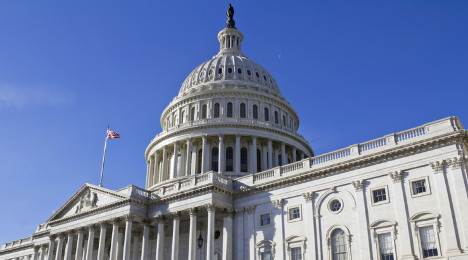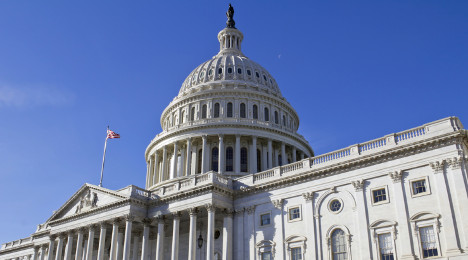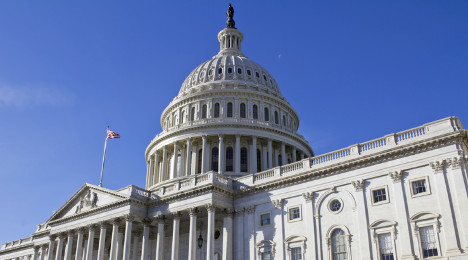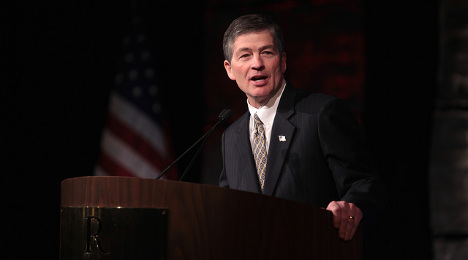Just ahead of when it rolled past five years of operation, the Consumer Financial Protection Bureau made three leadership changes involving the associate director for supervision, enforcement, and fair lending; the principal deputy general counsel; and the deputy chief operating officer.
“I am very pleased to announce the changes to senior leadership positions at the bureau,” CFPB director Richard Cordray said. “These leaders have played important roles in fulfilling the CFPB’s mission to protect consumers, and I am looking forward to continuing to work alongside them here at the bureau.”
Here are details about the three moves:
—Chris D’Angelo will serve as the CFPB’s associate director for supervision, enforcement and fair lending. D’Angelo is currently the bureau’s chief of staff. He joined the CFPB in June 2011 and previously served as senior advisor to the director and as an attorney in the Office of Enforcement.
D’Angelo came to the bureau from the U.S. Treasury Department, where he was senior advisor to the undersecretary for domestic finance and worked on financial regulation.
Before entering public service, D’Angelo worked as an associate at Cravath, Swaine and Moore in New York and later at Williams & Connolly in Washington, D.C.
—Richard Lepley will serve as the CFPB’s principal deputy general counsel in the office of the general counsel in the legal division. For the past five years, Lepley has worked as the deputy general counsel for general law, ethics and oversight at the CFPB.
Prior to joining the bureau in 2010, Lepley was the acting assistant general counsel for general law and ethics at the U.S. Treasury Department, working on draft legislation that became the Consumer Financial Protection Act.
Before working at the Department of Treasury, Lepley spent more than two decades as a litigator and manager in the federal programs branch of the civil division at the U.S. Department of Justice.
Prior to working in government, Lepley was an associate at Fulbright and Jaworski.
—Nellisha Ramdass will serve as the CFPB’s deputy chief operating officer. Previously, he was in charge of team operations in the office of technology and innovation including serving as the acting deputy chief information officer.
Prior to joining the bureau, Ramdass worked as a senior adviser to the chief operating officer of federal student aid at the Department of Education. Before that, he was a senior contracting officer at the Office of the Comptroller of the Currency.
This week, a broad coalition of business groups involved in the making, selling, servicing, financing and auctioning of vehicles urged Congress to support Senate legislation to preserve a consumer's ability to get discounted auto financing at the dealership.
In a letter to U.S. senators, the group of nine trade associations — including four organizations that participate at Used Car Week — asked for help in passing S. 2663, the “Reforming CFPB Indirect Auto Financing Guidance Act.” The legislation, introduced by Sen. Jerry Moran (R-Kan.), would rescind the Consumer Financial Protection Bureau’s 2013 auto finance guidance that could lead to limits on a consumer's ability to receive a discounted auto loan from a dealer.
“Access to affordable credit is essential to the vehicle industry and its customers, and the ability of a dealer to discount credit is often necessary to sell the vehicle,” the group wrote. “Since 2013, the CFPB has pressured finance sources to limit a dealer's ability to discount credit based on a deeply flawed method for measuring lender compliance with the Equal Credit Opportunity Act (ECOA).
“Industry stakeholders have tried, unsuccessfully, to work with the CFPB to preserve discounted auto loans by proposing a Department of Justice (DOJ) model that effectively manages fair credit risk while allowing discounts for legitimate business reasons,” the group continued.
Like its House counterpart — H.R. 1737, which passed on a bipartisan vote of 332-96, including 88 Democrats, on Nov. 18 during the midst of Used Car Week — S. 2663 would also require the CFPB to engage in an open and transparent process when issuing future auto finance guidance.
“The CFPB's attempt to eliminate the consumer-friendly practice of a dealer discounting credit has been sought not by rule, but by guidance and non-public enforcement actions,” the letter read. “This guidance was issued without any public comment, consultation with CFPB's sister agencies (including those that Congress authorized to regulate auto dealers), or transparency.
“Indeed, by the CFPB's own admission, the agency did not study the impact of its guidance on consumers,” it continued.
The letter also noted that S. 2663 would require the CFPB to follow an open process prior to issuing any new guidance related to indirect auto financing; and is purely a process bill, and therefore does not intrude on the CFPB's structure, jurisdiction, or authority, nor does it direct a result.
Additionally, the organizations pointed out the open and transparent process required by S. 2663 would provide a framework for the industry to adopt a DOJ fair credit model, which effectively meets the CFPB’s stated objective of addressing fair lending risks without preventing consumer discounts for legitimate business reasons, the letter explained.
“When Congress created the CFPB, surely it did not intend the agency to use its power to stop vehicle retailers from offering consumers discounts,” the letter added. “Keeping auto financing competitive is not only warranted, it is essential for the vehicle industry and its customers. That is why this legislation easily passed the House, and why the Senate should pass S. 2663.”
The letter was signed by:
— Peter Welch, president, National Automobile Dealers Association
— Mitch Bainwol, president and CEO, Alliance of Automobile Manufacturers
— Chris Stinebert, president and CEO, American Financial Services Association
— Phil Ingrassia, president, National RV Dealers Association
— Steve Jordan, CEO, National Independent Automobile Dealers Association
— Frank Hugelmeyer, president, Recreation Vehicle Industry Association
— Cody Lusk, president, American International Automobile Dealers Association
— Frank Hackett, CEO, National Auto Auction Association
— Tim Buche, president and CEO, Motorcycle Industry Council
Along with experts from NADA Used Car Guide, Stinebert, Jordan and Hackett will all be on stage during Used Car Week, which is set for Nov. 14 to Nov. 18 at the Red Rock Resort and Casino in Las Vegas.
For more details about why coming to Used Car Week can be enjoyable and profitable, go to www.usedcarweek.biz.
Five years ago today, the Consumer Financial Protection Bureau “opened our doors,” a milestone the regulator highlighted on its website. The Dodd-Frank Act that created the CFPB receives its operational funding the Federal Reserve, which literally can print money.
As a result, dealerships and finance companies have had to add compliance to their operating lexicon with the same frequency and importance as down payments, inventory, originations and securitizations. Some industry leaders and lawmakers have questioned the CFPB’s regulatory methodologies and enforcement actions since coming into the fray on July 21, 2011. But it’s certainly apparent the CFPB is here to stay in the auto financing space, and the players in it continue to adjust how to operate within the bureau’s reach.
To get some perspective on what these past five years have been like, SubPrime Auto Finance News reached out to a wide array of sources, including legal sage Tom Hudson, founding partner of Hudson Cook.
“Before the CFPB came into existence, the federal cop for enforcing most federal consumer protection laws was the Federal Trade Commission,” Hudson said. “The FTC, with a smaller staff than the CFPB, was charged with overseeing all businesses, not just creditors, and not just car dealers. The CFPB’s narrower focus and deeper 'bottomless' pockets have made for a much more intense regulatory and enforcement climate.
“Surprisingly, the laws and regulations that (apply to) dealers, finance companies and other creditors didn’t suddenly get bigger when the CFPB was formed,” he continued. “Most of the CFPB enforcement actions have dealt with allegations of violations of laws that have been around for decades — the Truth in Lending Act, the Equal Credit Opportunity Act, the Fair Credit Reporting Act and others.
“The difference we are seeing arises from the fact that the thinly-spread, underfunded FTC simply didn’t have the resources to launch a vigorous enforcement effort. The CFPB has those resources, and they’re using them,” Hudson went on to say.
To celebrate its fifth birthday, the CFPB mentioned some of its accomplishments in the video available here and at the top of this page with the resources Hudson referenced. Those marks include $11.7 billion in relief for more than 27 million consumers, figures that involved not only auto financing but also credit cards and mortgages.
At the controls of the CFPB is a single director — Richard Cordray — who President Obama appointed at the outset of the bureau’s opening. Someone who knows Cordray well is Shaun Petersen, who now is senior vice president of legal and government affairs at the National Independent Automobile Dealers Association. Petersen spent seven years in the Ohio Attorney General’s office and often crossed paths with Cordray, who eventually became the Buckeye State’s top law enforcement official before overseeing the CFPB.
Petersen previously described Cordray as one of the most intelligent individuals he’s ever encountered. In fact, Cordray has appeared multiple times and won several rounds on the popular game show “Jeopardy!”
“Although the CFPB might be the brainchild of Sen. Elizabeth Warren, it is clear director Cordray’s fingerprints are all over the CFPB,” Petersen said. “How can they not be when he is the sole director of an agency that is virtually insulated from congressional and presidential oversight?
“The fact that the director personally speaks at field hearings, signs consent decrees and testifies to Congress on these issues is a sign of his personal involvement,” Petersen continued. “When it comes to the bureau’s work with auto finance (or other topic areas), nothing gets done without the director’s blessing.”
Cordray is on tap to appear at the next CFPB field hearing. The bureau scheduled the event for next Thursday in Sacramento, Calif., where the topic will be one that’s been quite prevalent with its consumer complaint database — debt collections.
Along with discrepancies on a credit report, CFPB officials emphasized that debt collection is a consumer issue that they want to tackle. Digital Recognition Network chief executive officer Chris Metaxas highlighted what the prudent moves some auto finance companies are making and the areas involving collections where some institutions could improve.
“The key to effective commerce is knowing your customers. That means you need to stay close to them during their entire lifecycle experience with you,” said Metaxas, who will be making one of the keynote presentations during this year’s SubPrime Forum, where DRN is the presenting sponsor for that segment of Used Car Week.
“The mistake that lenders make is that they are reactive to a point in time,” he continued. “During origination, they scramble to get data to close the opportunity, and during collection they scramble to find you when the data was not up to date.
“That’s why smart lenders are now deploying location intelligence data, like vehicle sightings from DRN, throughout the entire lifecycle of the loan, so they can stay close, communicate frequently and adapt with you to help avert payment challenges,” Metaxas went on to say. “Location intelligence data simply lets lenders know more about their customers to improve their experience.”
The experience for finance companies since the advent of the CFPB certainly has been noteworthy. The bureau made enforcement actions against Ally Financial, American Honda Finance, Fifth Third Bank and more institutions in the auto finance space.
The industry certainly has pushed back, too. For example, the American Financial Services Association tapped Charles River Associates to open its string of rebuttals to contentions by the CFPB about problems with the indirect auto financing process.
The National Automotive Dealers Association has been vocal, as well — most recently with current chairman Jeff Carlson calling for support for measures currently circulating on Capitol Hill to “tame” the CFPB.
While the industry continues to navigate the regulatory demands of the CFPB, entities such as AFSA are looking toward what might happen during the next five years and beyond.
“Obviously, there are so many things that make the CFPB different from other agencies: its structure, its funding mechanism, its enforcement actions in lieu of clear-cut universal rules, etc.,” AFSA spokesperson Jack Ferry said.
“We are in constant dialogue with the CFPB on behalf of our members who are in the auto financing industry and the traditional installment industry. The lines of communication between the CFPB and AFSA are always open,” Ferry added.
And Petersen chimed in again on the dealership side.
“Part of NIADA’s core mission is to educate its dealers on the impact of laws from Congress and regulations from federal agencies, whether that regulation is imposed through a formal rulemaking process or is dictated through advisory guidance or enforcement action, as the CFPB tends to do,” he said.
“I believe dealers are recognizing the impact the CFPB is having on the industry and can have on their dealerships if they are not vigilant,” he went on to say.
With officials saying some auto finance companies “deceived” individuals in multiple ways, the Consumer Financial Protection Bureau recently tabulated that its supervisory actions during the first four months of the year uncovered “illegal activities” that led to approximately $24.5 million in restitution to more than 257,000 consumers.
The bureau’s report also highlighted issues CFPB examiners found through the agency’s examination of businesses not only in auto loan origination, but also debt collection, mortgage origination and small-dollar lending.
“This report highlights our ongoing work to address violations of the law and slipshod practices that endanger consumers,” CFPB director Richard Cordray said. “The bureau’s supervisors continue to perform more and better oversight of these financial markets, and their report gives the industry an opportunity to reflect on their practices before consumers are made to suffer harm.”
The 12th edition of Supervisory Highlights covers activities completed generally between January and April. The regulator went into its auto finance work in detail.
CFPB examiners determined that one or more auto finance companies “deceived” consumers into thinking their add-on product would fully cover the balance of a consumer’s loan in the event of the loss of their vehicle.
“In fact, the product covered less than the vehicle’s value,” the CFPB said.
Bureau examiners also said they found one or more auto finance companies “deceived” consumers about terms of a loan deferral, saying the only effect would be to extend the life of the loan and to accrue interest during the deferral.
“They didn’t tell consumers that subsequent payments would be applied to cover the interest earned on the unpaid amount from the date of the consumer’s last payment,” the bureau said. “This tactic could lead to the consumer paying more in finance charges than the lender originally disclosed.
“Examiners noted this practice broke the law regarding deceptive acts and practices,” the CFPB added.
Under the Dodd-Frank Wall Street Reform and Consumer Protection Act, the CFPB has authority to supervise certain nonbanks, including mortgage companies, private student lenders and payday lenders, as well as nonbanks the bureau defines through rulemaking as “larger participants.”
To date, the Bureau has issued rules to supervise the larger participants in the markets of consumer reporting, consumer debt collection, student loan servicing, international money transfers and auto finance.
Supervisory work during the first four months of 2016 in connection with debt sales also aided an enforcement action that returned nearly $5 million to consumers and imposed $3 million in civil money penalties, according to the CFPB.
The bureau went on to mention how often there was a failure to provide adverse action notices.
Under the Fair Credit Reporting Act, the CFPB emphasized consumers must be notified of any adverse action, such as denial of credit, based on information in a consumer report. Consumers must also receive information about the consumer reporting agency that produced the report, which would note that the reporting agency did not make the decision to take adverse action and cannot provide the consumer the specific reasons why it happened.
“Examiners found the violations were caused by a lack of appropriate training, and inadequate policies and procedures,” the CFPB said.
The latest CFPB report can be downloaded here.
For the seventh consecutive year, the American Financial Services Association and the National Automobile Dealers Association co-sponsored an executive forum to discuss legislative, regulatory and operational challenges facing dealers and finance sources.
Led by David Paul, chair of AFSA’s Vehicle Finance Division and senior vice president with American Honda Finance Corp., and NADA chairman Jeff Carlson, the organizations highlighted that chief executive officers and other top executives from virtually every major finance company and major bank in the nation engaged in indirect auto financing attended the forum, along with the leaders of the nation’s franchised dealers.
Representatives from the American International Automobile Dealers Association, National Association of Minority Automobile Dealers, and Automotive Trade Association Executives also were in attendance, according the recap AFSA shared this week.
AFSA mentioned the forum featured an “engaging” discussion with Consumer Financial Protection Bureau director Richard Cordray, who reviewed the bureau’s activities in the area of vehicle financing and offered some insight on the path forward.
In a separate presentation, AFSA shared that Brian Johnson, senior counsel to the House Financial Services Committee, and Jelena McWilliams, chief counsel to the Senate Banking Committee, offered their perspectives on the important role vehicle financing plays in the American economy.
Marguerite Watanabe, president of Connection Insights, and Andy Koblenz, executive vice president at NADA, each reviewed the finance source and dealer survey results focusing on finance company and dealer concerns and opportunities.
“Top concerns for finance sources include exams and enforcement actions, cybersecurity, compliance, changes in vehicle values, and hiring, training and retaining employees,” AFSA said.
“Dealers are most concerned with new regulations from the FTC and CFPB, existing regulations and compliance, and hiring, training and retaining employees,” the association continued. “New opportunities focused on technology improvements and mobile financing options for lenders, and leasing and e-contracting for dealers.”
An important number that the nation’s auto dealers should know is 2663. NADA’s battle to tame the Consumer Financial Protection Bureau continues and Senate bill S. 2663 is the next chapter. This bill, entitled, “Reforming CFPB Indirect Auto Financing Guidance Act,” is identical to last year’s House bill — H.R. 1737 —which passed the House with a resounding, veto-proof majority vote of 332-96, including 88 Democrats.
The National Automobile Dealers Association commends Sen. Jerry Moran (R-Kan.) for introducing this critical legislation this past March. Democrats and Republicans from both sides of the aisle have recognized a simple truth: Every consumer deserves access to competitive financing and great rates when they buy a new car or truck.
America’s franchised auto dealers strongly support S. 2663, and businesses that make, sell, service, auction and finance vehicles have also joined in this support. Practically the entire auto industry is united on this issue. Like H.R. 1737, the bill would rescind the CFPB’s flawed auto finance guidance, and make the bureau more transparent and accountable when issuing future guidance. The bill calls for a public comment period, coordination with regulatory agencies that possess authority over dealers and a study of the impact of the guidance on small businesses and, most importantly, consumers.
S. 2663 is a moderate bill that does not dictate a result. It’s important that dealers urge their Democratic senators to support S. 2663 when it comes up for a vote. Due to the shortened congressional session with the Presidential election looming, we need to be ready for a vote at any time.
The bill allows for transparency and public notice so the public has an opportunity to analyze and to comment on the CFPB’s attempt to change the auto financing market via “guidance.” And it protects fair credit laws and their enforcement in order to safeguard equal opportunity in auto financing.
We’re fighting for what dealers have known from the beginning: our current system of convenient dealer-assisted financing is fair and competitive. It boosts access to affordable credit for consumers and saves them money.
At the same time, NADA supports the Senate in its oversight to ensure that the CFPB’s actions do not hurt consumers, especially those with less-than-perfect credit. If the CFPB intends to disrupt our highly efficient model, it can only be justified through reliable and sound analysis. Yet the CFPB continues to try to eliminate a dealer’s ability to discount credit for consumers, despite a clear prohibition in Dodd-Frank against regulating dealers.
The optional NADA/NAMAD/AIADA Fair Credit Compliance Policy & Program is being adopted by a growing number of franchised dealers. Many are taking the proactive steps to ensure that the deserved participation that we earn when arranging financing falls within the Equal Credit Opportunity Act. Each of the three major credit application aggregators-including several other companies-have licensed the use of the program to facilitate its adoption and implementation by dealers.
The significant flaws in the CFPB’s policy do not serve the nation’s 16,500 franchised dealers-or the consumers they proudly serve.
NADA will continue to support our members through these challenges as we prove that dealers provide the most competitive, efficient consumer benefits on the planet in our current auto finance model.
Visit NADA.org/autofinance to learn more about how the CFPB’s campaign to eliminate discounted financing rates is raising credit costs for consumers.
Jeff Carlson is chairman of the National Automobile Dealers Association and a Ford and Subaru dealer in Glenwood Springs, Colo.
Consumer Financial Protection Bureau director Richard Cordray has five more chores on his to-do list courtesy of the U.S. Government Accountability Office (GAO).
Within the week of its contract spending strategy being revealed through the federally mandated website USASpending.gov, the CFPB received five more recommendations from GAO officials who run the independent, nonpartisan agency that works for Congress.
During its audit of the CFPB’s fiscal years 2015 and 2014 financial statements, GAO identified deficiencies in CFPB’s internal control over accounting for property, equipment, and software that collectively constituted a significant deficiency in CFPB’s internal control over financial reporting. Specifically, GAO found that CFPB did not effectively design or implement controls to reasonably assure accurate and timely classification and recording of software costs and maintain ongoing accuracy and completeness of property and equipment inventory records.
In addition, GAO officials said they identified deficiencies that they did not consider to be material weaknesses or significant deficiencies, either individually or collectively, but nonetheless warrant CFPB management’s attention. These control deficiencies are related to reviewing and approving financial statements.
The five new recommendations include:
—To provide reasonable assurance that the property, equipment and software transactions are properly tracked and capitalized or expensed as appropriate, the director of CFPB should direct the program offices to require vendors to provide detailed invoices with costs broken out by project.
—To provide reasonable assurance that the property, equipment and software transactions are properly tracked and capitalized or expensed as appropriate, the director of CFPB should direct the chief financial officer to update OCFO’s financial records to include costs by project.
—The director of CFPB should direct the Office of Technology and Innovation’s chief information officer to develop and document training materials that are consistent with CFPB’s policies and procedures and provide training to employees, on a recurring basis, on how to conduct inventory of electronic equipment and how to update and maintain accurate inventory records.
— The director of CFPB should direct the chief financial officer and chief information officer to develop and implement procedures that require coordination between the OCFO and the Office of Technology and Innovation to provide reasonable assurance that the records maintained by both divisions are accurate, consistent, complete, and comparable for inventory and accounting purposes.
— The director of CFPB should direct the chief financial officer to design and implement effective procedures over the preparation of CFPB financial statements and note disclosures, including procedures such as completing the FAM 2010 and 2020 checklists at fiscal year-end, to provide reasonable assurance that the financial statements as of fiscal year-end are prepared in accordance with GAAP and note disclosures are adequate.
The GAO indicated that it found the CFPB had completed corrective actions on two of the four recommendations from GAO’s prior management report that remained open at the beginning of GAO’s fiscal year 2015 audit. As a result, CFPB currently has seven financial audit-related GAO recommendations to address: the previous two open recommendations and the five recommendations GAO is making in its report.
“CFPB stated that it agreed with the recommendations GAO made in the report and has implemented or is in the process of implementing actions to address the issues GAO identified,” GAO officials said.
“GAO will evaluate CFPB’s actions for addressing the deficiencies identified in the report as part of GAO’s fiscal year 2016 audit,” they added.
Earlier, according to data posted on USASpending.gov, the CFPB funded $57,106,226 in government contracts during the 2016 fiscal year. The single most costly line item was advertising services — a sum surpassing $15 million and dwarfing the next two categories that had titles sounding like what might qualify for services rendered.
Coinciding with the federally mandated website disclosing how the Consumer Financial Protection Bureau spends its budget on government contractors, more U.S. House members — including Speaker of the House Paul Ryan — continued the parade of bill proposals and other ideas about how to modify the CFPB’s structure and regulatory powers.
First, according to data posted on USASpending.gov, the product or service where the CFPB spent the most money during the 2016 fiscal year came within the line item of advertising services — a sum surpassing $15 million and dwarfing the next two categories that had titles sounding like what might qualify for services rendered.
As advertising services was by far the largest budget outlay — exactly $15,282,721 covering 26 transactions with government contractors — coming in next was what was classified as support- professional: program evaluation/review/development. USASpending.gov indicated this category included 23 transactions for a total of $8,614,491.
Not far behind was the third-highest category — program management/support services — consisting of 22 transactions and totaling $6,134,457.
All told, the site indicated the CFPB funded $57,106,226 in government contracts during the fiscal year.
And which firms landed those contracts? USASpending.gov — the publicly accessible, searchable website mandated by the Federal Funding Accountability and Transparency Act of 2006 — contained those details, too.
Securing the highest amount of CFPB contract funds was GMMB, a firm with offices in Washington, D.C., and Seattle that specializes in public relations and communications. GMMB secured $14,442,752 through 14 contracts with the bureau.
According to its LinkedIn profile, GMMB said, “We’re activists at heart. When we opened our doors in 1983 we had one goal in mind: to create positive change through electoral politics and issue advocacy. And we’ve never lost sight of the underlying mission that drives what we do — using communications, advertising and digital and social media to help foundations, nonprofits, associations, governments and socially conscious corporations make this world a better, healthier and safer place.”
The next three firms scoring the most funds from the CFPB hailed from the accounting, legal and financial services worlds, including:
—Deloitte: $8,174,120 through six contracts
—Ernst & Young: $7,073,159 through three contracts
—PricewaterhouseCoopers: $6,140,241 through 19 contracts
And for comparison, the CFPB spent significantly more money during the fiscal year than another federal regulator that frequently oversees auto financing — the Federal Trade Commission. USASpending.gov indicated the FTC spent a total of $23,561,061 on contracts with most of that figure — $13,659,188 to be exact — going to what was classified as expert witnesses through 159 contracts.
The CFPB receives its funding directly from the Federal Reserve, not through a lawmaker budget process — one of the points that raises the ire of some legislators. Back in April, a vivid partisan divide appeared again when the House Financial Services Committee approved a measure that would place budget appropriations for the CFPB within Congressional jurisdiction.
The committee approved what is being called the Taking Account of Bureaucrats’ Spending Act by a vote of 33-20 with the entire opposition tally coming from Democrats.
Another member of the House — Rep. Matt Salmon of Arizona — introduced a bill to amend the way complaints are handled by the CFPB. The Republican lawmaker explained the proposal would require the bureau to verify and put into context the consumer complaints the CFPB is presenting.
“By verifying these complaints with evidence of actual wrongdoing, Americans will have a greater understanding of various financial products and be better informed of any violations committed by these institutions,” Salmon said.
“Under current law, the CFPB launched a Consumer Complaint Database that serves as a mechanism to inform the consumer about potentially troublesome institutions,” he continued. “We owe it to the American people to make this information as accurate and as clear as possible. Unfortunately, the current database is disorganized and does little to provide the American people with important information to inform their decision-making.
“My bill would improve the current database by requiring the CFPB to verify the facts of each complaint and present this information in an aggregated format so that consumers have better access to CFPB-collected data and can make better decisions about their financial futures,” Salmon went on to say.
Meanwhile, Ryan also is rolling out a broad plan for widespread reform that is incorporated within the moniker “A Better Way.” One of the ideas includes modifying the Dodd-Frank Act as well as how the CFPB generally operates.
“All of us — not government — should have the biggest role to play in our lives,” Ryan said. “That’s what these next two planks in our agenda are about. Regulations should serve to help, not hinder the workers and risk-takers at the heart of our economy. And after decades of executive overreach, it is time we restore self-government and the separation of power. This is a better way to uphold our Constitution and preserve the pursuit of happiness.”
Upon hearing Ryan’s proposals, cheers came from Richard Hunt, president and chief executive officer of the Consumer Bankers Association.
“We applaud Speaker Ryan and House Republicans for their efforts to strengthen the governance structure of the CFPB. As we see at the vast majority of independent federal agencies, a bipartisan commission at the helm will provide a balanced, fair, deliberative approach to supervision, regulation, and enforcement,” Hunt said.
“Most importantly, it offers a stable form of leadership that will preserve the agency’s role regardless of a President Trump or Clinton,” Hunt continued. “Additionally, we thank them for highlighting the need to improve a number of other issues hurting consumers’ access to credit.
“We look forward to working with the House to advance these proposals to the Senate and then the White House,” Hunt went on to say.
Momentum to modify how the Consumer Financial Protection Bureau is structured and operates gained more steam this week.
Soon after the U.S. House Financial Services Committee chairman outlined his plan to revamp the Dodd-Frank Act and more, the House Appropriations Committee’s fiscal year 2017 Financial Services and General Government Appropriations bill passed out of the committee. That measure includes a provision to alter CFPB leadership from a single director to a five-person group.
“We applaud House appropriators for taking steps to make needed improvements to the CFPB on behalf of consumers,” said Richard Hunt, president and chief executive officer of the Consumer Bankers Association. “Chief among the reforms is the creation of a five-person, bipartisan board that would preserve it as a stable, strong and effective regulator, regardless of a President Trump or Clinton.
“CBA also appreciates the committee requiring the bureau to take a second look at its arbitration and small-dollar lending proposals before consumers are potentially harmed,” Hunt continued. “We are grateful the committee sees the wisdom in these commonsense improvements and encourage the full House and Senate to follow their lead in protecting consumers.”
Along with what Hunt referenced, the bill provides annual funding for the Treasury Department, the Judiciary, the Small Business Administration, the Securities and Exchange Commission and other related agencies.
The bill totals $21.7 billion in funding — $1.5 billion below the fiscal year 2016 enacted level and $2.7 billion below the budget request of President Obama.
“The job of this bill is two-fold: to make wise investments with taxpayer dollars in the programs and agencies that we need to grow our economy and enforce our laws, and to tightly hold the reins on overspending and overreach within federal bureaucracies,” House Appropriations chairman Hal Rogers said. “This bill makes great strides on all accounts — carefully investing taxpayer dollars in programs that promote opportunity, while keeping these agencies accountable to the American people.”
The bill passed through the committee by a vote of 30-17.
Rep. Ander Crenshaw added, “Federal agencies have a duty and obligation to use hard-earned taxpayer dollars in the most effective and efficient manner. Americans work hard for the money they send to Washington and expect their legislators to make the same tough budget decisions that they have made. Our bill is the product of comprehensive hearings with input from both sides of the aisle with an emphasis on economic growth and job creation through small businesses, while bolstering law enforcement to protect our citizens.
“In addition, our bill reduces funding for agencies that we believe can produce results with fewer dollars. And, where there is a history of inappropriate behavior, such as the Internal Revenue Service, cutbacks and reforms are recommended to hold them accountable,” Crenshaw went on to say.
The Capitol Hill activity came after Rep. Jeb Hensarling, the Texas Republican who also is the House Financial Services Committee chairman, offered his plan to replace the Dodd-Frank Act and promote economic growth during a speech to the Economic Club of New York on Tuesday.
Hensarling shared details of the Financial CHOICE Act, with CHOICE standing for “creating hope and opportunity for investors, consumers and entrepreneurs.”
Receiving immediate support from organizations such as the Consumer Bankers Association and the American Bankers Association, Rep. Jeb Hensarling, the Texas Republican who also is the U.S. House Financial Services Committee chairman, has a plan he described as a way to replace the Dodd-Frank Act and promote economic growth.
During a speech to the Economic Club of New York on Tuesday, Hensarling shared details of the Financial CHOICE Act, with CHOICE standing for “creating hope and opportunity for investors, consumers and entrepreneurs.”
“If we want strong economic growth and more freedom, we must empower Americans, not Washington bureaucrats,” said Hensarling, a devout critic of not only Dodd-Frank but also the Consumer Financial Protection Bureau.
“We must offer all Americans greater opportunities to raise their standard of living and achieve financial independence,” he continued. “In a phrase, we need economic growth for all and bank bailouts for none. This is the foundation of the Republican plan to reignite growth by replacing Dodd-Frank with real reforms that work.”
Hensarling cited an inventory of harm caused to consumers and the economy by Dodd-Frank and branded the law “a grave mistake” that “has failed.”
The Financial CHOICE Act, which Hensarling said will be introduced as legislation later this month, has seven main components, including:
1. Economic growth must be revitalized through competitive, transparent, and innovative capital markets.
2. Every American, regardless of their circumstances, must have the opportunity to achieve financial independence.
3. Consumers must be vigorously protected from fraud and deception as well as the loss of economic liberty.
4. Taxpayer bailouts of financial institutions must end and no company can remain too big to fail.
5. Systemic risk must be managed in a market with profit and loss.
6. Simplicity must replace complexity, because complexity can be gamed by the well-connected and abused by the Washington powerful.
7. Both Wall Street and Washington must be held accountable.
“Accountability is at the heart of our Republican reform plan. If we are to successfully protect consumers and grow our economy, we must demand greater accountability from both Washington and Wall Street,” Hensarling said. “Our plan toughens penalties — not out of some ideological or poll-driven war against Wall Street — but simply to better protect consumers and strengthen their markets. This is key to economic growth.”
To end taxpayer-funded bailouts and “too big to fail,” Hensarling highlighted that the Financial CHOICE Act would create a new subchapter of the bankruptcy code tailored to specifically address the failure of large, complex institutions. In April, the House approved similar bipartisan legislation to establish a new bankruptcy process for financial institutions with assets of $50 billion or more.
“Taxpayer bailouts of financial institutions must end, and no company can remain ‘too big to fail,’” Hensarling said.
As a result of the Republican plan, “some large firms will likely become smaller because the credit they now obtain will be priced according to their inherent risk of failure without implicit government guarantees backing firms that are ‘too big to fail.’ As a result, failure — when it does happen — will be more contained,” he continued.
Banks that make the choice to be strongly capitalized will be eligible for relief from Washington regulations “that create more burden than benefit,” according to Hensarling.
“To avail themselves of this exchange, many larger banks will have to raise significant additional equity capital. Most community banks will have to raise little to no additional capital. Regardless, the option remains with the bank,” he went on to say.
Hensarling mentioned the Financial CHOICE Act also includes more than two dozen measures to provide additional regulatory relief for community banks and credit unions. He insisted that while big banks have gotten even bigger since Dodd-Frank became law nearly six years ago, community financial institutions are disappearing at an average rate of one per day.
The chairman added that dozens of witnesses representing small banks and credit unions have come before the Financial Services Committee to describe the harm caused to their customers by the avalanche of Washington’s post-crisis regulations.
“Pro-growth reforms in our plan will provide much-needed relief to community financial institutions that are being crushed by Washington’s one-size-fits-all regulatory approach,” Hensarling said. “This allows America’s small hometown banks and credit unions to focus their time and resources on their customers rather than the dictates of Washington bureaucrats.”
Richard Hunt, president and chief executive officer of the Consumer Bankers Association, immediately cheered Hensarling’s proposal.
“Like any 2,300-page bill, the Dodd-Frank Act is imperfect. We applaud Chairman Hensarling for his persistent commitment to seeking needed changes to the Dodd-Frank Act that will bring balance and consistency to an industry serving millions of consumers,” Hunt said.
“Most especially, we thank the chairman for his inclusion of a five-person, bipartisan board at the CFPB in order to provide stable, long-term leadership at the CFPB — regardless of a President Trump or Clinton,” he continued. “We look forward to working with the chairman and the entire committee throughout this process.”
And James Ballentine, ABA’s executive vice president of congressional relations and political affairs, added this perspective: “We appreciate the work of Chairman Hensarling and members of the House Financial Services Committee as they strive to remove regulatory impediments that stand in the way of economic growth.
“Members from both sides of the aisle agree that parts of Dodd-Frank just aren’t working. Any law that generates more than 24,000 pages of proposed and final rules will inevitably include problems that should be fixed,” Ballentine continued.
“We look forward to working with the committee and anyone who will help remove obstacles that make it harder for America’s banks to serve their customers and meet the needs of their local communities,” he went on to say.
An executive summary of the Financial CHOICE Act can be downloaded here.
Hensarling’s complete prepared remarks from Tuesday’s event can be read here.












